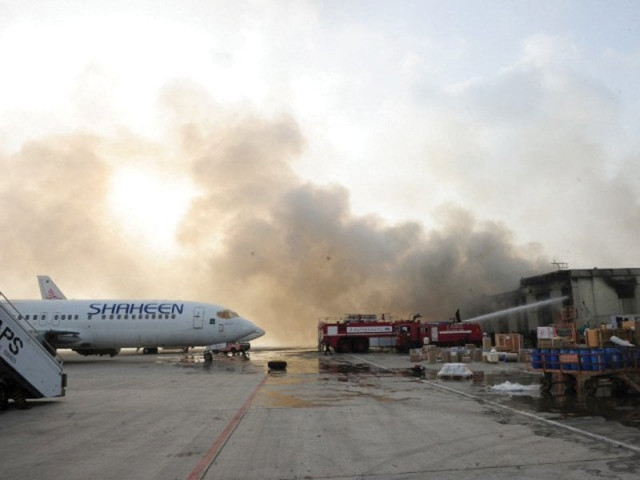Rising costs amid sky-rocketing security concerns
Insurance premiums on shipping lines increase following threats of attacks.

Industry people fear a snowball effect on multiple businesses across the supply chain after the Karachi airport attack. PHOTO: AFP
In the immediate aftermath of the brazen attack on Karachi airport earlier this month, Hong Kong-based Cathay Pacific decided to pull out, wrapping up its four weekly flights 13 years after it started operation.
If this wasn’t enough, businessmen and traders are seeing their costs going up across the board even when the operation is under way.
S M Muneer, the chief executive of Trade Development Authority of Pakistan (TDAP) and chairman of Din Group of Companies, talked about the fallout of security concerns in a matter of fact manner.
“I have a client in Europe we have been doing business with for years. He called me up after the Karachi airport incident to ask if I’ll be able to meet the orders,” Muneer recently told a gathering. “This is the kind of environment we have to operate in.”
Every time the US and EU textile buying houses refuse to come to Pakistan, businesses here have to send their executives to Dubai or other countries for meetings, incurring unnecessary costs.
Then they also have to face the hard task of convincing their buyers that there won’t any shutdowns and shipments will make their way to the port on time.
Similarly, whenever the foreign airlines like Singapore, Malaysian, Lufthansa and British Airways have pulled out the passengers have not just lost direct flights but the Civil Aviation Authority (CAA) also loses substantial part of its income.
But perhaps the most immediate impact would translate into higher cost of goods coming in and going out of Pakistan.
Industry officials say foreign trade will become expensive by at least $40 million a year as insurance premiums on shipping lines increase following threats of attacks on foreign interests.
Normally known as war risk cover, the cost of trading with a country with security concerns, is made part of the freight, which has already started to inch up slowly, they said.
“I am seeing a rise in cost of anything between $20 million and $30 million,” says Najib Balagamwala, a large importer of commodities. “Normally this war risk was applicable on the African countries. But we are also paying the price.”
It is too early to estimate the exact rise in cost of import and export of goods but industry people fear a snowball on multiple businesses across the supply chain.
Balagamwala says that even a minor increase of a few dollars on a ton translates into substantial disadvantage for Pakistani traders.
“For example if insurance cost on coal is $17 per ton and it goes up by just one dollar, the impact translates into millions of dollars considering volume of imports.”
People associated with international sea trade dread even imagining a Karachi airport like attack on port facilities.
“Things can go very bad for us if similar attacks continue to take place,” says Faisal Maqsood, CEO of Harbour Services Limited. “Even now I see the cost of trade exceeding by $40 million because of this threat.”
The premium for insurance covering cargo on ships calling on Pakistani ports had come down to between $3,000 and $5,000 from $10,000 to $15,000 six years back, he said. “I see that going back.”
Published in The Express Tribune, June 23rd, 2014.
Like Business on Facebook, follow @TribuneBiz on Twitter to stay informed and join in the conversation.



















COMMENTS
Comments are moderated and generally will be posted if they are on-topic and not abusive.
For more information, please see our Comments FAQ